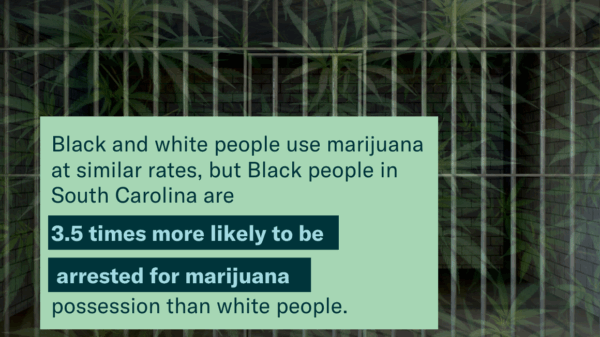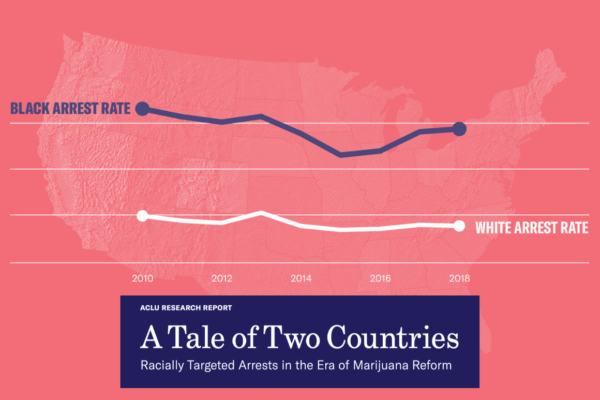FOR IMMEDIATE RELEASE
CHARLESTON – Today the American Civil Liberties Union released a new report that showed Black people are almost 3.5 times more likely than white people to be arrested for marijuana possession in South Carolina, despite comparable national marijuana usage rates. Although the total number of people arrested for marijuana possession has decreased in the past decade, nationally, law enforcement still made 6.1 million such arrests over that period, and the racial disparities in arrest rates remain in every state. In addition, South Carolina has seen a substantial increase in the number of marijuana possession arrests.
The report, A Tale of Two Countries: Racially Targeted Arrests in the Era of Marijuana Reform, details marijuana possession arrests from 2010 to 2018 and updates our unprecedented national report published in 2013, The War on Marijuana in Black and White. The disturbing findings of this new research show that despite several states having reformed marijuana policy over the last decade, far too much has remained unchanged when it comes to racial disparities in arrests. Key findings include:
- Across the U.S., law enforcement made more than 6.1 million marijuana-related arrests from 2010 to2018. In South Carolina alone, there were 38,289 marijuana arrests in 2018, the vast majority of which (34,229) were for possession. In 2018, marijuana possession arrests accounted for 48 percent of all drug arrests in South Carolina.
- South Carolina had the second highest marijuana possession arrest rate in the nation.
- Overall national arrest rates have trended downward, however in South Carolina, marijuana possession arrests have actually increased 52.8% percent from 2010 to 2018.
- Nationally, in 2018, law enforcement made more marijuana arrests than for all violent crimes combined.
- A Black person in South Carolina is 3.5 times more likely to be arrested for marijuana possessionthan a white person in 2018, up from 2.8 times more likely to be arrested in 2010 and 1.8 times more likely to be arrested in 2001.
- Pickens, Oconee, Horry, Lexington, and Greenville counties have the largest disparities in marijuana arrests, ranging from 8.36x (Pickens) to 5.25x (Greenville).
- Seven of the top 20 counties in the United States for marijuana possession arrest rates are in South Carolina. The counties and their rankings are Chester (#1), Newberry (#3), Darlington (#5), Marion (#7), Laurens (#13), Kershaw (#14), and Colleton (#17) counties.
A Tale of Two Countries: Racially Targeted Arrests in the Era of Marijuana Reform comes at a time when the criminal legal system is overwhelmed by the COVID-19 public health crisis that demands expedited decarcercal action to safeguard the lives of those incarcerated in and employed by jails and prisons. The reforms recommended in this report provide a road map for reducing marijuana arrests and criminalization as governors, prosecutors, judges, and other stakeholders across the country grapple with the harms presented by the public health crisis and take steps to release people from jails and prisons.
"Sold to the public in the name of public safety, South Carolina’s marijuana laws needlessly ensnare tens of thousands of people -- disproportionately Black people -- in its criminal justice system every year. This does not make us safe, and it ruins lives,” said ACLU of South Carolina Executive Director Frank Knaack. “Our marijuana laws are justified using code words like ‘law and order’ and ‘tough on crime’ – code words long used to maintain a racist system that stops, arrests, and convicts Black people at staggering rates compared to white people. It is time for our communities to define and advance our vision for what a just, equitable, and safe South Carolina should look like. And, part of this vision must be the legalization of marijuana with racial equity at the foundation of such reform.”
To combat the racial disparities rampant in marijuana-related arrests, the ACLU of South Carolina is calling not only for an end to racialized policing, but also for specific measures to redress inequities caused by decades of racist enforcement and harmful drug laws that do not advance public health or safety. This includes pressing for passage of statewide marijuana legalization and the federal MORE Act, which aims to correct historical injustices of the failed War on Drugs that has terrorized Black communities and decriminalizes marijuana at the federal level, reassesses marijuana convictions, and invests in economically disadvantaged communities.
Documents
Related Content

It's Time for South Carolina to Change its Marijuana Laws
Stay Informed
Sign up to be the first to hear about how to take action.
By completing this form, I agree to receive occasional emails per the terms of the ACLU’s privacy statement.
By completing this form, I agree to receive occasional emails per the terms of the ACLU’s privacy statement.

